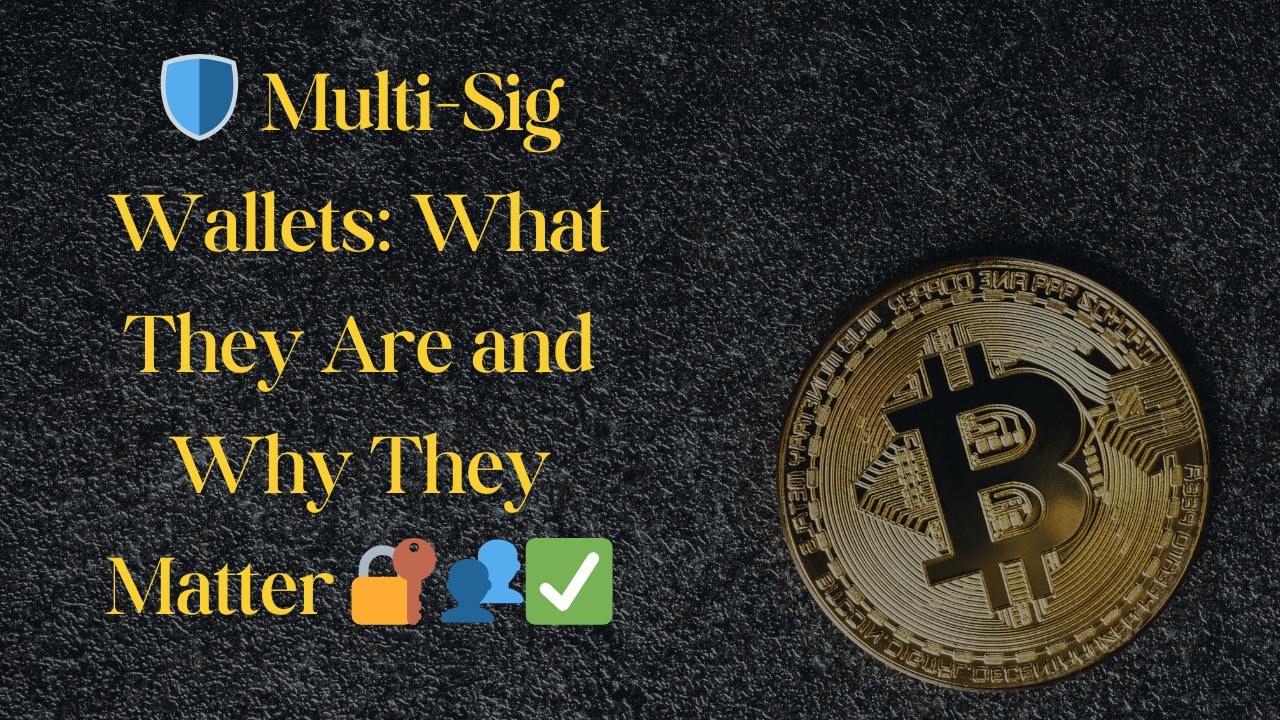🛡️ Multi-Sig Wallets: What They Are and Why They Matter 🔐👥✅
2025-04-02 23:35:05.544 +0000 UTC

🛡️ Multi-Sig Wallets: What They Are and Why They Matter
In the world of crypto, security is everything. 🔐 While self-custody wallets put you in control, they also come with one big risk: if you lose your private key or seed phrase, your funds are gone. 😨
Enter multi-signature wallets (aka multi-sig). These wallets offer a more secure, flexible, and collaborative way to manage crypto—especially for teams, DAOs, families, and serious investors. 👥💼
In this guide, we’ll break down what multi-sig wallets are, how they work, and why you might want to use one. Let’s get started! 🚀
🔍 What Is a Multi-Sig Wallet?
A multi-sig wallet is a crypto wallet that requires two or more private keys to authorize a transaction. Instead of relying on a single key (like most wallets), it uses multiple signers. ✅
Example:
- 👨 Alice, 👩 Bob, and 👨💼 Charlie create a 2-of-3 multi-sig wallet
- 🔐 Any 2 out of the 3 must approve a transaction before it goes through
- 🚫 One person cannot act alone
📋 Types of Multi-Sig Setups
🔑 M-of-N Structure
- 📊 M = Minimum number of required approvals
- 📦 N = Total number of participants with access
Popular setups:
- 2-of-3 – Common for small teams or couples
- 3-of-5 – Ideal for DAOs or companies
- 1-of-2 – For backup or emergency recovery
🎯 Why Use a Multi-Sig Wallet?
✅ 1. Enhanced Security
- 🔐 Prevents single point of failure
- 👥 Even if one key is compromised, hackers can’t steal funds
✅ 2. Shared Responsibility
- 🧠 No one person has full control
- 💼 Great for managing company funds, community treasuries, or family investments
✅ 3. Emergency Backup
- 📁 Set up a multi-sig with your personal devices or trusted contacts
- 🆘 Recover access even if one device is lost or damaged
✅ 4. Prevents Rash Decisions
- 🛑 No one can make a large withdrawal or risky move without consensus
- 🧘 Encourages transparency and thoughtful governance
👥 Who Should Use Multi-Sig?
- 🏛️ DAOs (Decentralized Autonomous Organizations)
- 👨👩👧👦 Families managing long-term crypto assets
- 🏢 Companies holding treasury funds
- 💼 Power users or whales who want top-tier security
🛠️ Best Multi-Sig Wallet Platforms
1️⃣ Gnosis Safe
- 🌐 Popular for DAOs and DeFi teams
- 📲 Supports multiple chains (Ethereum, Polygon, BNB, etc.)
- 🧩 Integrates with apps like Snapshot, Zodiac
2️⃣ Casa
- 🔐 Focused on Bitcoin
- 👤 Easy onboarding and recovery system
- 📞 Customer support and inheritance planning
3️⃣ Sparrow Wallet (for advanced users)
- 🖥️ Desktop wallet with multisig coordination tools
- 🔐 Ideal for Bitcoin security purists
📥 How to Set Up a Multi-Sig Wallet (Gnosis Example)
- 🌐 Visit Gnosis Safe
- ➕ Click “Create New Safe”
- 👥 Add wallet addresses of each signer
- 📝 Set the approval threshold (e.g., 2 of 3)
- 🧠 Review and deploy the Safe (requires gas)
🔐 Once created, all transactions will require signatures from the minimum number of wallets.
⚠️ Things to Keep in Mind
1. Gas Fees
- ⛽ Multi-sig transactions may cost more than regular ones
- 🧾 Budget accordingly, especially on Ethereum
2. Coordination Time
- 🕓 Transactions require multiple people to sign
- 📅 Can slow down urgent actions—plan ahead!
3. Backup and Recovery
- 📲 Ensure each signer backs up their wallet and seed
- 🧠 Have a fallback strategy if someone becomes unavailable
🔐 Multi-Sig vs. Single-Sig Wallets
| Feature | Single-Sig | Multi-Sig |
|---|---|---|
| Security | Low (if key is lost or stolen) | High (multiple approvals needed) |
| Ease of Use | Very easy | Requires coordination |
| Risk of Error | High (one mistake can be fatal) | Lower (checks and balances) |
| Ideal For | Individuals | Teams, DAOs, families |
🧠 Final Thoughts
Multi-sig wallets are one of the most powerful tools in crypto security. Whether you're managing a DAO treasury or just want better protection for your BTC stack, multi-sig adds a valuable layer of safety. 🛡️🧠
Take control of your crypto. Share responsibility. And sleep better knowing it takes more than one mistake to lose it all. 😴🔐
💬 Coming up next: 🧾 How to Report Crypto on Your Taxes (Legally)


